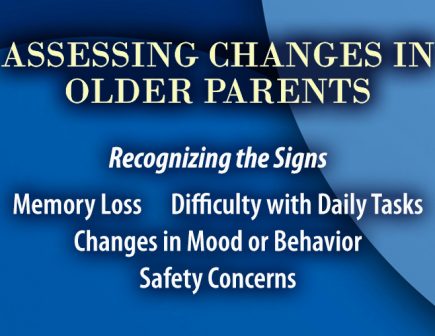
Recognizing the Signs
The first step in assessing the need for memory support or an assisted living community is to recognize the signs that indicate a decline in your parent’s ability to live independently. Unlike normal, age related memory loss; memory loss due to potential disease will have a much deeper impact on your parent’s quality of life. Some common signs to look out for include:
- Memory Loss: Forgetfulness that disrupts daily life, such as forgetting appointments or repeatedly asking the same questions.
- Difficulty with Daily Tasks: Struggling to manage household chores, personal hygiene, manage finances, or medication schedules.
- Changes in Mood or Behavior: Uncharacteristic mood swings, confusion, or agitation.
- Safety Concerns: Evidence of accidents, such as falls or kitchen mishaps, getting lost, or neglecting home maintenance.
Having the Conversation
Once you’ve observed concerning signs, it’s essential to have an open and honest conversation with your parent about these concerns. When entering these conversations, do so with empathy, and reassurance, and maintain the dignity of your parent. If necessary, involve other family members or a trusted healthcare professional. Remember to listen to your parent’s wishes and involve them in the decision-making process.
Seeking Professional Assessment
After the initial conversation, it may be time to seek a professional assessment of your parent’s cognitive and physical health. A comprehensive evaluation by a healthcare provider, such as a geriatrician or neurologist, can provide valuable insights into your parent’s condition and help determine the most appropriate level of care. There is a level of care that professionals are able to provide that you, as a caregiver, may not be able to. Making the decision to transition a parent to assisted living can be emotional, but it’s important not to delay the move if the need for care is clear.
Touring Memory Care and Assisted Living Communities
If the assessment indicates the need for additional support, it’s time to explore memory support and assisted living community options. Schedule tours of different communities to evaluate their amenities, safety measures, staff expertise, and overall atmosphere. During the tours, consider how well the environment and services align with your parent’s specific needs and preferences. Remember, that not all memory support and assisted living communities offer the same level of care. Understanding which level of support your parent needs, will help you make the best decision for your family.
Assisted Living Vs. Memory Care
When looking for the best option for your parent(s), consider the differences in assisted living communities, and memory care to see which may be the best fit. Assisted living communities are an excellent option if your parent is in need of assistance completing activities of daily living, or ADLs. Residents typically reside in apartments and condos, caring for themselves with as needed assistance from professional caregivers. Memory care is for those who require long-term care due to memory loss or those with continuing cognitive decline. These communities offer a similar environment to assisted living communities, offering an enriched therapeutic, and if needed safe and secure level of care 24/7.

Supporting the Transition
Once a decision has been made, it’s crucial to support your parent through the transition to memory care or an assisted living community. Help them with the practical aspects of relocating, such as downsizing and packing, and provide emotional support during this big life change. Stay involved in their care and maintain regular communication to ensure that they are adjusting well to their new living arrangement. Regular communication and visits to the assisted living facility are essential to ensure that your parent is receiving the necessary care and support.
Assessing changes in your older parents concerning memory care and assisted living requires careful observation, open communication, and thorough research. By approaching this process with empathy and a commitment to making well-informed decisions, you can help ensure that your loved ones receive the support and care they need to thrive in their later years.
